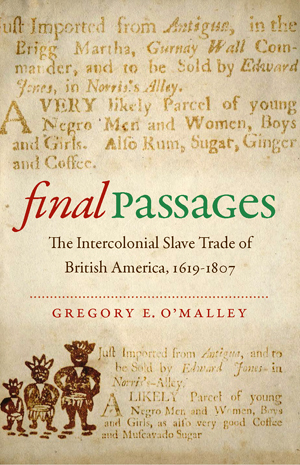Associate professor of history Gregory O’Malley has been honored with four awards this year for his latest book, Final Passages: The Intercolonial Slave Trade of British America, 1619-1807.
The book examines the dispersal of African captives throughout the Americas after their initial arrival from Africa.
The UC Santa Cruz historian traveled to Little Rock, Arkansas, in November to pick up his most recent award, the 2015 Frank L. and Harriet C. Owsley Award from the Southern Historical Association, in recognition of “the most distinguished book in southern history published in 2014.”
This past summer, he flew to the Bahamas to pick up the 2015 Elsa Goveia Book Prize in Caribbean History. Given by the Association of Caribbean Historians, this award is presented once every two years for the best book (in English, Spanish, French, or Dutch) in the field of Caribbean history.
“O’Malley transforms our understanding of the dynamics of the slave trade in the New World and redraws the map of the final destinations of forced African immigrants during the slave trade era,” noted the Elsa Goveia Book Prize committee.
“It is a major contribution both to the history of slavery, the African diaspora, and to the history of trans-Atlantic and inter-Caribbean commerce during the 17th and the 18th centuries.”
In October, it was also announced that O’Malley won two separate awards for the book from the American Historical Association (AHA), the oldest and largest society of historians and professors of history in the United States.
He received the AHA’s 2015 James A. Rawley Prize in Atlantic History, offered annually “to recognize outstanding historical writing that explores aspects of integration of Atlantic worlds before the 20th century.”
He was also honored with the AHA’s 2015 Morris D. Forkosch Prize, offered annually in recognition of the best book in English in the field of British, British imperial, or British Commonwealth history since 1485.
O’Malley’s book draws on a database of more than 7,000 intercolonial slave trading voyages compiled from port records, newspapers, and merchant accounts to identify and quantify the major routes of the intercolonial slave trade.
He documents that these voyages were a crucial component in the development of slavery in the Caribbean and North America and that “trade in the unfree led to experimentation with free trade between empires.”
According to the William and Mary Quarterly, the premier journal for colonial American history: “With the publication of Final Passages, the historiography of the intra-American slave trade has made a giant leap forward.”
History professor wins multiple awards for groundbreaking book on slave trade




